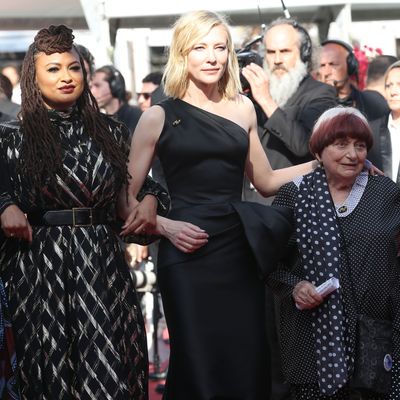
Cannes jury president Cate Blanchett and Palme d’Or-winning director Agnes Varda stood atop the steps at the Lumière Theater this evening, joining arms with 82 other women to demand an increase in female representation at the Cannes Film Festival and in the film industry at large. Representing each of the 82 female directors who have climbed those steps to see their own films premiere at Cannes in the festival’s 71 years — versus the 1,688 male directors — the group represented 5050X2020, an initiative which, as its name suggests, seeks to get to 50/50 gender representation across the entire Cannes lineup by 2020.
Blanchett and Varda read the group’s statement in English and French respectively, and emphasized the need for a cinema whose demographics more accurately reflect the world’s. “Women are not a minority in the world, yet the current state of our industry says otherwise,” they said. “As women, we all face our own unique challenges, but we stand together on these stairs today as a symbol of our determination and commitment to progress.” The statement, which can be viewed in full here, went on to demand equality and safety in the workplace for women, equal pay, and transparency.
The demonstration took place before the premiere of Eva Husson’s Girls of the Sun, one of only three films by women directors playing in this year’s competition, out of 21. (That puts the numbers at a dismal 14 percent for female directors, while the entire festival lineup comes in at 24 percent for female directors. This is down from 2017’s competition.) Last year, juror Jessica Chastain commented at a press conference how “disturbed” she was by the depiction of women in many of the films she watched; she challenged the festival and director Thierry Frémaux to include more female storytellers in the next year’s lineup. So when the competition films for this year’s festival were announced and still reflected no change, there was reason to wonder what was going on behind the scenes.
The Cannes Festival, a notoriously — and yes, often lovably — stodgy institution, is facing pressure on all sides to catch up to the present. The heated back and forth between Frémaux and Netflix has generated a lot of press, but the festival’s old-school culture also trickles down into latent, implied belief that women just can’t make an important film on the level that men can; that their primary purpose is to be looked at. It imbues everything from the expectations of women on the red carpet, to events and panels that run throughout the festival. Even after the powerful moment 5050X2020’s women staged, the red carpet DJ found it appropriate — perhaps … funny? — to blast “Pretty Woman” over the loudspeakers as the group dispersed and made their way into the theater. One step at a time.

